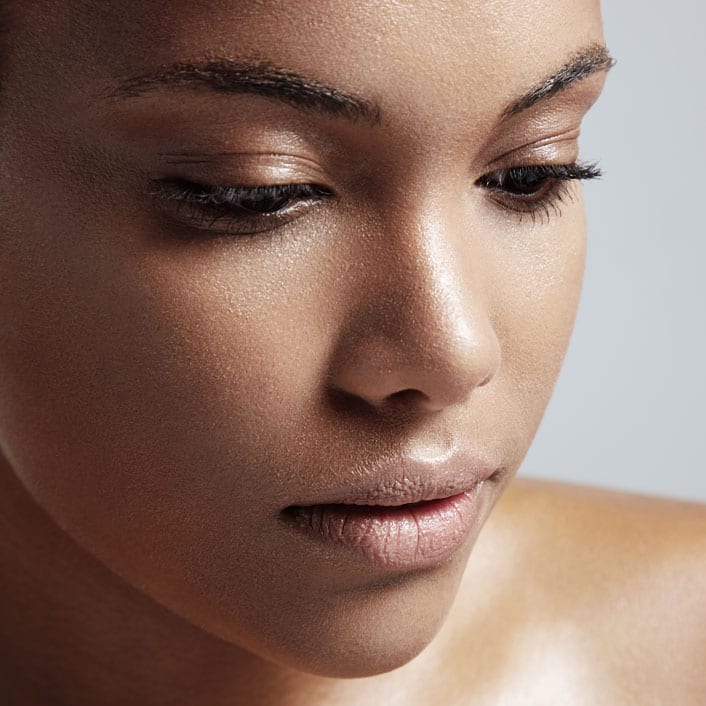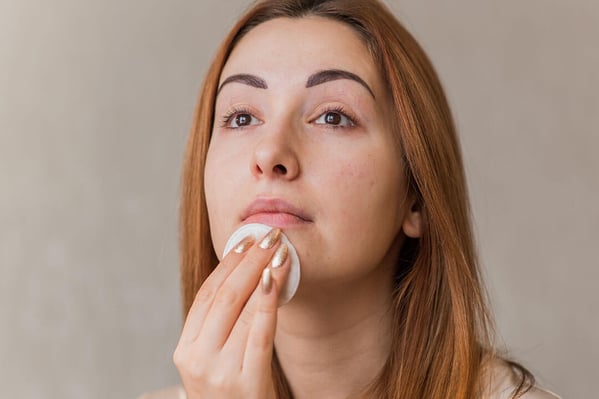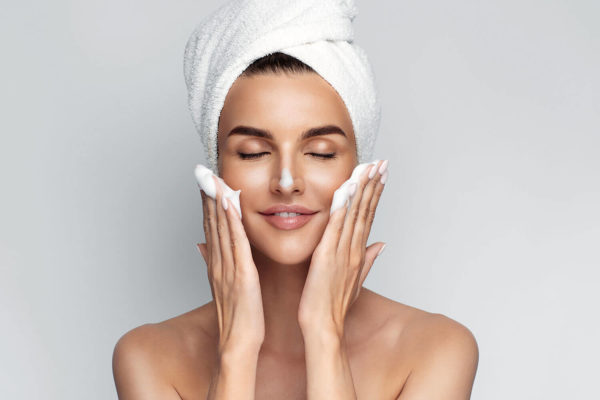A Complete Guide to Makeup and Skin Care for Oily Skin
We’ve all dealt with it from time to time. It’s abnormally humid outside and our makeup starts to slide off. We forget to wash our face after a good workout and we have a minor breakout the next day. Nearly everybody deals with the effects of an overproduction of oil on the skin at least once in their lives. Millions of people deal with an overproduction of oil every day, though, no matter what they’ve done or how the weather is outside. If you think you might be dealing with overzealous sebaceous glands, an in-depth guide to skin care for oily skin can help.

Do you often find yourself breaking out? This may be an oily skin symptom as well. If your sebum problem is only mild, you may just notice occasional pimples that are persistent before they go away. On the other hand, if you have a serious oil problem, your skin could seem to break out constantly and have clogged pore or blackheads.
Consider whether these issues affect you as well. People with oily skin will often find they leave behind a “trail” of sebum. Does your makeup come off on your clothes or your pillows? Perhaps your face seems to be shiny even after you’ve just washed it. If you have bangs, they may feel greasy even if you washed your hair that morning. These are all signs of oily skin as well.

Another common cause of oily skin is a poor skincare routine. Most commonly, this means you are under- or over-cleansing. If your skin is oily, you should wash it in the morning and evening, as well as after working out. If you aren’t doing this, you’re allowing skin to produce more oil than it needs to, mix with dirt, and create clogged pores. On the other hand, cleaning too much causes your skin to think it’s too dry and create more sebum as well, so be sure not to overdo it.
There are other causes as well, although they are usually less common. Sometimes, oily skin is due to genetics. If your parents or older siblings have oily skin, you are more likely to as well. What about your diet? If you aren’t eating plenty of healthy meals and drinking enough water, your skin is likely to show the signs of overproduction of oil. Finally, even medication you can take, such as hormone replacements or oral contraceptives, can cause your sebaceous glands to produce too much oil.
Finally, did you know that the weather itself can cause your skin to become too oily? If you live in an area that experiences all four seasons, you probably notice your skin is more oily during the warm months. People in southern states often have oily skin all year. This is because the hot weather and related humidity cause your skin to secrete more sebum than usual, which causes your skin to have more oil on the surface.
That doesn’t mean you should pack up and move north, though. Weather that is too dry or cold can cause the same problem. This is because it causes your skin to become too dry. In turn, your oil glands decide they need to make more sebum, go into overdrive, and create more than you actually need, causing oily skin.

Keep in mind that most people have a T-Zone that is oilier than the rest of their face. You should determine your skin type before following a skin care routine for oily skin. If your cheeks often feel dry, for example, you may have combination skin. A dermatologist can help you determine which products are best for you if you aren’t sure.

- Use an Exfoliating Cleanser
Dermatologists recommend using an exfoliating cleanser every time you wash your face. Those created with salicyclic acid are especially preferable for removing excess oil and preventing dead skin from building up in the pores. Use your hands or a soft cloth to gently scrub your face. Avoid sponges, loofahs, or exfoliating gloves, as they can damage the skin and actually cause more oil to be produced. - Apply Toner
After gently washing and rinsing your face, it is time to apply a toner. Toner is useful because the absorbent liquid removes traces of oil, excess dirt, or makeup that you may have missed while you were washing your face. In addition, it helps to control acne breakouts and level out your skin’s pH balance. Experts recommend a toner that includes glycolic acid, lactic acid, or salicylic acid for those who have oily skin. - Treat Current Breakouts
If you have a current breakout, treat the acne after using your toner. In the morning, using a sulfur or benzoyl peroxide can lessen oil production and prevent your breakout from becoming more serious. During the evening, products with retinol in them create a more youthful complexion while keeping your pores clear. - Remember to Moisturize
Next, it’s time to moisturize. Do this in the morning and before bed. Some people mistakenly avoid moisturizing, assuming it creates even more oil. In reality, avoiding moisturizer can make the problem worse. The key is to choose the right product. The best moisturizer for someone with oily skin is oil-free, water-based, and feels lightweight on the skin. Most products for acne-prone skin will meet these recommendations. - Touch Up Throughout the Day
Finally, people who have oily skin often need to “touch up” throughout the day. The American Academy of Dermatology suggests investing in high-quality blotting papers. You can gently press them to your T-Zone throughout the day to absorb excess oil and keep your skin looking healthy.

- Primer
Primer is essential for makeup looks on all skin types, but if you’re prone to oily skin, choosing the right one is even more important. Seek out a primer that is made to control oil production and give your makeup a matte (non-shiny) finish. Eyeshadow primer is also important, especially if you’re going for an intricate look. - Foundation
Foundation pulls your entire look together in most cases, but oily skin can cause the wrong formula to slide right off. Search for those that claim to be for long-lasting wear or to be mattifying formulas. These ones are specifically made to combat shine and stay in place. Don’t use cushion compacts, which can hold onto oil and reapply it to your face later, and avoid anything “luminous,” which is just a fancy way of saying “shinier.”How you apply your foundation is just as important. Never use your hand, which is likely to just spread oil around. Instead, use a foundation brush or blending sponge and start with a very small amount to avoid a cakey look. You can always add more as needed. Remember to wash your brushes and sponges often to avoid bacteria buildup that can clog pores and cause breakouts.
- Translucent Powder
Translucent powder can be a lifesaver for someone with oily skin. Use a big brush and a bit of powder to set your primer, and use it again after you apply your foundation. It helps to soak up excess oil and goes even further when it comes to keeping your makeup in place. - Mascara
Throughout the day, sweat and oil can get into your eyes and cause your mascara to run if you aren’t careful. Stick to a waterproof formula to prevent raccoon eyes in the middle of the afternoon. - Lip Liner
T-Zone oil can also cause your lipstick to smear or dissipate around the edges of your lips. Use a lip liner to create a solid base and keep your lipstick in place all day. - Setting Spray
Finally, set your entire look with a de-slick setting spray. Sprays are weightless and help to control oil, combat shine, and keep your look fresh all day. Look for a spray that is long-lasting or claims to be mattifying.

- Omega-3 Fatty Acids – Omega-3s support the regeneration of healthy skin cells and can block inflammation. They are most common in salmon and sardines, but can also be found in almonds, walnuts, and sunflower seeds.
- Selenium – Selenium protects skin from the damages related to free radicals and may be able to improve acne when used in combination with vitamin E. You can find this antioxidant in eggs, brown rice, tuna, salmon, and garlic.
- Vitamin A – This regulates the skin cycle to prevent oil from becoming trapped, but keep in mind that too much of it can be toxic. Your daily intake shouldn’t exceed 10,000 IU and it should never be taken when pregnant or nursing. Find Vitamin A in broccoli, carrots, salmon, and fish oil.
- Vitamins C and E – These two antioxidants calm skin and create a healthy, oil-free glow. You can find vitamin C in citrus fruits. Vitamin E is common in nuts, sunflower seeds, leafy greens, and sweet potatoes.
- Zinc – Zinc can calm skin that is already irritated because of breakouts. You can find it in wheat germ, Brazil nuts, almonds, and turkey.
Your sebaceous glands don’t need to wreak havoc on your life. A strong skin care routine for oily skin, a healthy diet, and the knowledge of why your skin is oily and how to avoid triggers is all you need to fight oil and get the flawless face you want and deserve.
Understanding Your Skin Type: A Comprehensive Guide
Your relationship with your skin determines its health and quality. Identifying your [Read More...]
6 Face Washes for Oily Skin to Balance Your Radiance
Let’s celebrate your oily skin! The extra sebum keeps skin soft and [Read More...]
Best Makeup for Oily Skin
The only time oily skin works against you is when you do [Read More...]
Balance Your Skin: Best Luxury Oily Skin Products for Beautiful Skin and Shine Control
Oily skin can dampen your self-confidence and make you feel uncomfortable. Achieving [Read More...]
The Best Skincare for Oily Skin
There are a few universal rules regarding taking care of your skin. [Read More...]
4 Contenders for the Best Facial Oil for Dry Skin
Dryness is a condition that can affect any type of skin, including [Read More...]
Best Skincare Routine for Oily Skin
Finding the proper skincare routine for oily skin can make a massive [Read More...]
What Causes Oily Skin?
Everyone’s skin has a little shine due to their sebaceous gland, which [Read More...]
10 Tips for Oily Skin In Summer
While your dry-skinned friends may rejoice at the start of summer, you [Read More...]
Why You Should Use Exfoliating Cleansers for Oily Skin
Using the right cleansers for oily skin not only improves your appearance [Read More...]











